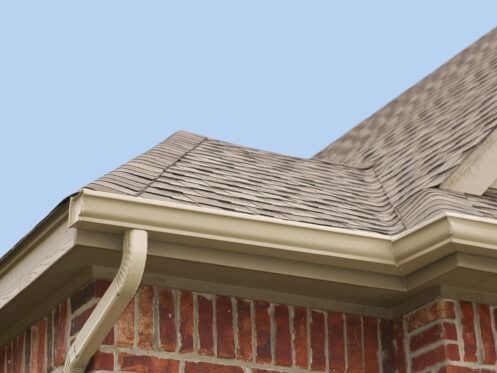Since your Alpha, NJ, home is likely the biggest investment that you’ve made, it’s crucial to protect it. This includes choosing the right gutter guards. Your gutters direct rain and other precipitation away from your home.
They can’t function properly when clogged with leaves, twigs, and other debris. When they’re clogged, water can build up and enter your home, which could lead to rot and mold. A gutter guard keeps this debris from getting in the gutters, so your gutters can effectively funnel water away from your home.
Why Do I Need a Gutter Guard?
In the summer, thunderstorms in New Jersey can dump significant amounts of rain in a very short period. At other times of the year, a warm day can bring rapid snow melting. Without the protection of gutter guards, your gutters can rapidly accumulate leaves and other debris. When that happens, the water has nowhere to go and will overflow the gutters.
Water pooling near the roof can penetrate the fascia board that runs along the bottom of the roof. When that layer of protection rots away, water can enter under the roof and into your home’s attic and outer walls. It can also get behind the siding.
This can cause significant damage to your home’s structure and even your belongings. In winter, problems often multiply. Debris in the gutter can cause ice dams. As ice expands, it can lift the shingles and cause other damage to the roof and its underlying structure.
When water isn’t channeled away by the gutters, it can also run down the outside walls of your home and form puddles. The water can then penetrate the foundation, leading to cracks and other damage. Pooled water next to the home can also flood the basement.
A clogged gutter can also damage your landscaping. Without proper channeling, water gushing from the roof can form trenches throughout your yard. Anything in the water’s path, including topsoil and mulch, can get swept away.
Clogged gutters can attract the mosquito population. Stagnant water is a perfect breeding ground for mosquitos and other pests. Having gutter guards also means less maintenance. You won’t have to climb a ladder after strong winds or a heavy rainstorm to clean them out.
Types of Gutter Guards
Before you know what type of gutter guard will work best for your home, you first need to understand your options. While some are available at retail stores, we recommend professional installation for the best results and longevity. Installing some types of guards yourself could also void your roof warranty.
The six types of gutter guards are:
- Foam
- Screen
- Mesh
- Micro-mesh
- Reverse curve
- Brush
Foam gutter guards are perhaps the least expensive but also the least durable. You should think of them more like a disposable gutter guard option. You insert them in the gutter, and, like a sponge, they allow water to flow through while keeping debris and insects out.
Another inexpensive type of gutter guard is a screen guard, usually made of perforated metal or plastic. These are placed over the gutter and will often attach to the gutter with clips. However, depending on the size of the holes, they may not be as effective at catching small debris like pine needles. They are also not as durable as other types and may not stay in place during high winds.
Mesh and micro-mesh guards are typically made with woven materials. They have smaller holes than screens, and micro-mesh can keep even small debris, like needles and insects, out of the gutter. While slightly more expensive than screen guards, mesh and micro-mesh offer quick installation and better durability. Because spruce, pines, and other conifers are common in the Alpha area, micro-mesh guards are often the preferred choice.
Reverse-curve gutter guards rely on surface tension to allow water to enter the gutter while keeping debris out. They look like a hood or helmet over the gutter and, as a result, are visible from the street. This tried-and-true design is effective, but not all homeowners like its aesthetic quality. Professional installation is highly recommended for this type of guard to be effective and long-lasting. DIY installation of this type of guard has the potential to damage your roof.
Gutter brushes work by trapping debris and allowing water to pass. Because they collect debris, they must be cleaned often to maintain the flow of water. Also, their bristles can’t catch smaller types of debris, like pine needles. While inexpensive, they may need to be replaced frequently.
What to Look for in a Gutter Guard
Choosing the right gutter guard for your home involves balancing many factors. Here are some of the key considerations, and you can consult with our professional roofers for additional guidance.
Cost
Pricing is a major consideration for many homeowners. However, durability should also be considered when looking at the price tag. If a product is very cheap but you must replace it every couple of years, it may end up costing more in the long run.
Compatibility
Of course, you need to make sure that your chosen type of gutter guard will work with your existing gutter system. Consulting with a trusted roofer will ensure a seamless installation that will function well for a long time.
Materials
Gutter guards can be made from metal or plastic. The most common materials are PVC, vinyl, steel, and aluminum. You’ll need to be careful when choosing steel guards to make sure they are high-quality and rust-proof. Aluminum is preferred by many homeowners as it’s lighter in weight than steel and more durable than plastic.
Type of Debris
Consider what type of debris will likely be falling into your gutter. If you have a lot of pine trees, then screen and brush gutter guards are probably not the best option. Micro-mesh might be the most effective if your landscape will yield a lot of smaller debris, like pollen, needles, and small seeds and pods.
Appearance
Will your gutter guards be visible from the street? This is a major consideration for some homeowners. While reverse-curve guards are available in several colors, you won’t be happy if you don’t like how they look.
Maintenance
One of the benefits of having gutter guards installed is decreased maintenance. If low maintenance is a major consideration, you might prefer the reverse-curve gutter guard. Of course, maintenance will vary based on your specific landscaping, the way the home is oriented, and other factors.
Your Reliable, Local Roofing Service Provider
At Warren Thompson & Son Roofing & Siding, we’ve served the roofing needs of our community since 1973. As a multi-generational, veteran-owned company, we value honesty and integrity in everything we do. We are GAF Master Elite certified and have an A+ rating with the BBB. We’re a full-service roofing company offering roof repair and replacement for residential and commercial buildings. We also install and repair and gutters.
Give Warren Thompson & Son Roofing & Siding in Alpha a call when you need gutter guards or have any other gutter or roofing needs.

